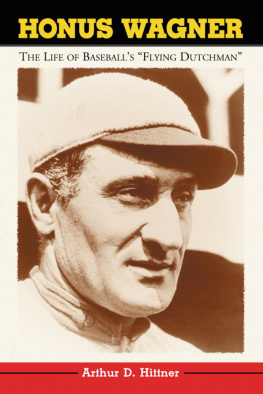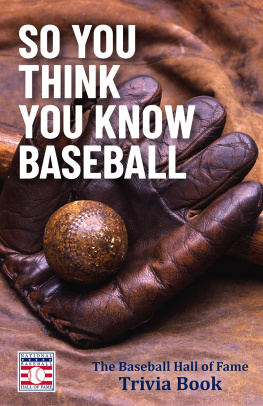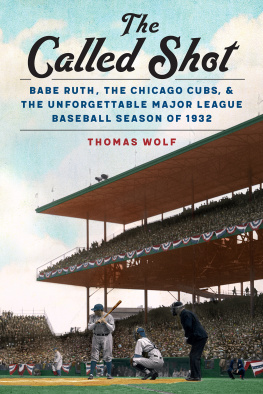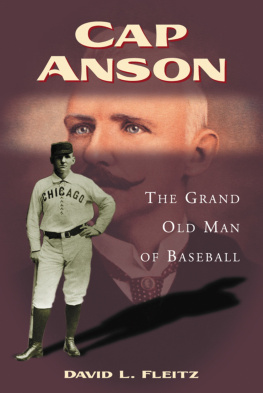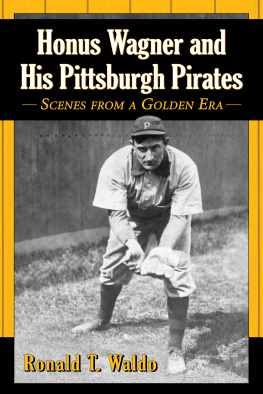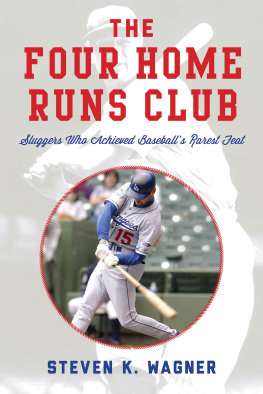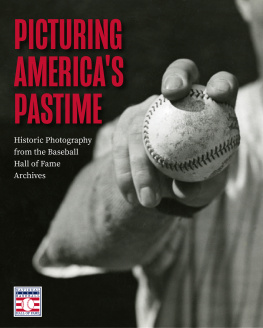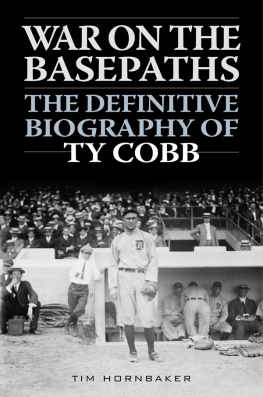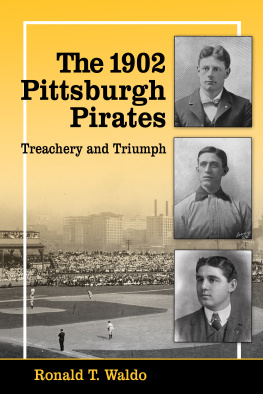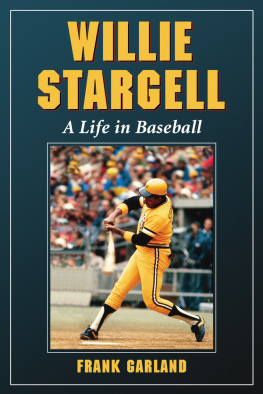
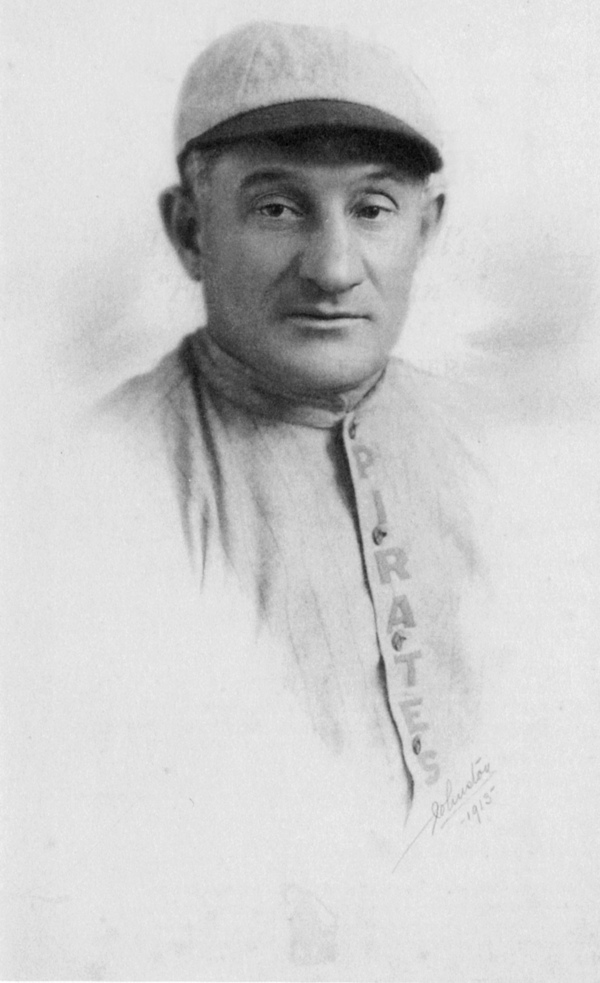
Honus Wagner studio portrait, signed Johnston 1913 (courtesy Leslie Blair)
HONUS WAGNER
The Life of BaseballsFlying Dutchman
by ARTHUR D. HITTNER

McFarland & Company, Inc., Publishers
Jefferson, North Carolina, and London
British Library Cataloguing-in-Publication data are available
LIBRARY OF CONGRESS Cataloguing-in-Publication Data
e-ISBN: 978-1-4766-0395-7
1996 Arthur D. Hittner. All rights reserved
No part of this book, specically including the table of contents and index,may be reproduced or transmitted in any form or by any means, electronic ormechanical, including photocopying or recording, or by any informationstorage and retrieval system, without permission in writing from the publisher.
McFarland & Company, Inc., Publishers
Box 611, Jefferson, North Carolina 28640
www.mcfarlandpub.com
For Mom and Dad
ACKNOWLEDGMENTS
PREPARATION OF THIS BOOK would have been impossible without the generous assistance of a host of ne people. To Jennifer Weiss, my indefatigable research assistant in Carnegie, Pennsylvania, I owe a huge debt of appreciation. I am also particularly grateful to Leslie Blair, who shared with me her recollections and gave me access to a wealth of information contained in family scrapbooks. A.D. Suehsdorf kindly lent to me the voluminous research les he compiled in writing his seminal article on Wagners rst year in professional baseball. Jerry Lansche, Glenn Stout and Richard Bak were kind enough to share with me their research. My thanks also to John Appuhn and collectors Harold Anderson and Ken Felden, for making available to me several of the vest-pocket notebooks kept by Wagner during his playing career. Additional thanks to Bill and Doug Gladstone and Rob Ruck for reviewing and commenting upon drafts of this work; Mark Rucker for his gracious assistance with photographs; Mel Staffin for his resourceful procurement of microlm materials; Ruth Rossi for her help in translating correspondence and research materials from Germany; Mary Beckman for her help in preparing the manuscript, and Grace Weaver for her enthusiastic all-around assistance since this effort began. The staffs of the Adrian Public Library, Marion Public Library, National Baseball Library, Paterson Free Public Library, Society for American Baseball Research, Tuscarawas County Public Library and Wilmington (Delaware) Public Library were particularly helpful. My heartfelt appreciation also to Frau Hell and Hermann Bock of Dirmingen, Germany, and to Dave Chase, Ralph Kiner, Miriam Kahn, Jay Acton, Inge Hanson, Corey Seeman, Carol Goldbach, Stanley Winston and the late Betty Blair. To my wife, Peggy, and children, Jeffrey and Lauren, my abiding thanks for their patience and support: its not easy living with a maniacal baseball historian (or, for that matter, with the life-sized painting of Honus Wagner which greets them as they start each day).
Finally, special recognition is in order for the talented members of the rst generation of baseball-beat writers, men such as James Jerpe of The Pittsburgh Gazette Times and Ralph S. Davis of The Sporting News, whose lively game accounts and commentary informed and entertained this writer much as they did a legion of dedicated readers more than three-quarters of a century ago.
PREFACE
FEW WOULD DEBATE Honus Wagners stature as the greatest shortstop in baseball history. The record speaks for itself. A search beyond the statistics, however, is fraught with disappointment. The work of modern baseball historians reveals little of Wagner beyond familiar clichs and timeworn anecdotes. The substance beneath the legend has been largely obscured by time.
Beginning in Cooperstown, New York, on a frigid March morning ve years ago, I began a personal quest to uncover the story of Wagner. I wanted to do more than simply revisit the record: I wanted to see him perform and to experience the professional game as he played it at the dawn of the twentieth century.
None remain who bore witness to the remarkable career of The Flying Dutchman. Beginning a hundred years ago on makeshift diamonds in Pennsylvania, Ohio and Michigan and continuing until his retirement in 1917, Wagners heroics captivated those fortunate enough to watch him perform in long-demolished venues like Forbes Field and the Polo Grounds. Countless others devoured the lively accounts of his play which crammed the sports pages of the nations thriving dailies.
The articulate though often anonymous stories and commentaries of baseballs earliest beat writers comprise an invaluable rst-hand record of Wagners career and the best source of information on his life. Tapping microlm resources, I pored over no less than three thousand game accounts, from the picturesque stylings of quirky, small-town reporters of the 1890s to the full-blown narratives of the great sportswriters of the early twentieth century. I perused many additional clippings preserved in Wagner family scrapbooks and the les of the National Baseball Library. From these materials emerged a vivid picture of Wagner the ballplayer, and a portrait, albeit somewhat less precise, of Wagner the man.
The sportswriters of Wagners era were far more solicitous than their modern counterparts in respecting the privacy of the athletes they covered. This fact, combined with the reserved, often bashful, disposition of Wagner throughout his playing career, complicated efforts to dene him beyond the diamond. While little personal material exists for the biographer, I was fortunate to locate three vestpocket notebooks which he maintained during the 1904, 1910 and 1911 seasons. Though sparse, the notes, names and other miscellaneous entries were helpful in identifying the subjects which occupied him outside the white lines. A tantalizing surprise was the discovery of a pair of partially obliterated entries from the 1910 notebook suggesting that Wagner may have been an uncooperative target of the pervasive gambling element which, within a decade, would destroy the game.
I sought to debunk persistent myths about Wagner, many of which he perpetuated. Reminiscences from his later years, by which time he had become a loveable raconteur, proved notoriously unreliable. Dulled by time and embellished by retelling, Wagners colorful yarns were calculated principally to entertain. With few exceptions, I eliminated from this work tales which could not be conrmed by contemporary newspaper or other third-party accounts. Where stories could be veried, every effort was made to relate them as accurately as possible.
Though not pretending to be a social historian, I have nevertheless strived to place Wagner in proper perspective within the multi-ethnic, turn-of-the-century American society to which he belonged. The son of proud German immigrants, he was a legitimate folk hero of the burgeoning immigrant class.
The process of researching and writing this book was a labor of love. Like a time traveller, I was transported almost daily to an era in which baseball was truly our national pastime, savoring, however vicariously, the incomparable exploits of baseballs earliest stars. None shone more brightly than Honus Wagner.
ARTHUR D. HITTNER
Acton, Massachusetts
Next page
